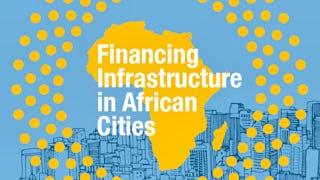In this course, we will explore how debt and equity can be used to finance infrastructure investments and how investors approach these investments. We will discover the crucial importance of infrastructure in modern economies and the evolution of financing methods in the context of growing global needs.

Enjoy unlimited growth with a year of Coursera Plus for $199 (regularly $399). Save now.

Skills you'll gain
Details to know

Add to your LinkedIn profile
5 assignments
See how employees at top companies are mastering in-demand skills

There are 5 modules in this course
The first module introduces the topic of the importance of infrastructure in modern economies. First, an attempt is made to point out that in the next 20 years, the need for infrastructure at a global level and at the level of industrially developed countries (USA and Europe) will be particularly significant and will require the mobilisation of significant financial resources. Next, an attempt is made to clarify the meaning attributable to the term 'infrastructure'. In the jargon used by private investors, in fact, several classifications are possible, some based on a traditional/sectoral approach (economic infrastructure vs. social infrastructure), others based on the different quantification of the underlying risk and return (core, core+ and value added). Finally, the focus is on ESG impacts, with particular reference to the E and S elements that infrastructures pose in the face of a growing awareness of the need to make such investments sustainable over the long term.
What's included
7 videos1 assignment6 plugins
The module presents the categories of investors in the infrastructure sector. The initial introduction provides a high-level view of the two categories (the public investor and the private investor) and the investment motivations underlying each of the two groups. It then moves on to an examination of public financing of infrastructure: the driving role of infrastructure on the growth of the economic system and jobs (fiscal multiplier and job multiplier) is clarified, but it is also pointed out that in recent years privatisation policies and budget constraints have led to a steady reduction in public investment and an increase in the infrastructure gap. The plans of the US government (IRA), the EU (NextGen and Repower EU) and Italy (PNRR) are a response to this decline. Finally, private financing of infrastructure is considered and the attributes of infrastructure that are attractive to a private investor are clarified. The different types of investors (greenfield and brownfield) are clarified and it is shown that infrastructure investments are very stable even in times of market crisis and recession (recession-resilient investments).
What's included
5 videos1 assignment3 plugins
The module clarifies why the concept of infrastructure is 'in motion', evolving. The general introduction gives a high-level overview of why what we define as infrastructure today may no longer be so in the coming years (the 'stranded assets') as well as investments that were not considered infrastructure until a few years ago are perfectly so today. The first interview presents the energy sector and the evolutions it has undergone (decarbonisation and ecological transition), the situation in Italy is assessed and the possible implications for the future. The second interview focuses on a very innovative sector and therefore seemingly far removed from the concept of infrastructure (but not resource infrastructure as seen in module 1) such as agritech. It is clarified why agriculture is the infrastructure of the future, the Italian situation and the implications for investors. The third interview focuses on an even more innovative sector such as the space economy. The perimeter of the space economy, the implications for investors and the Italian situation are clarified. The last interview with F2i's Alberto Ponti clarifies sustainability issues in infrastructure investment. From the perspective of a large national infrastructure investor, we analyse how ESG issues enter into the investment process of a large fund and guide its strategic decisions.
What's included
6 videos1 assignment2 plugins
The module introduces the financial technique used for greenfield infrastructure projects: project financing. A high-level overview of this technique is given in the introduction together with some data on the market in question. In the first part, a simple definition of project finance is presented using the example of the "time bomb" to clarify the difference with traditional financing of any other investment. It then goes on to examine the network of contracts used in project finance transactions by identifying the four key contracts that are essential to the success of the operation (EPC, supply of raw materials, sale of products or services, maintenance and operation contracts).Finally, it clarifies the main categories of risk underlying infrastructure projects, both during the construction and operational phases, and presents the main solutions that can be used to reduce/mitigate these risks.
What's included
11 videos1 assignment2 plugins
This Week is dedicated to the final evaluation of the course.
What's included
1 video1 assignment
Instructors


Offered by
Explore more from Finance
 Status: Preview
Status: PreviewUniversità Bocconi
 Status: Free Trial
Status: Free TrialBanco Interamericano de Desarrollo
 Status: Free Trial
Status: Free TrialBanco Interamericano de Desarrollo
 Status: Preview
Status: PreviewUnited Cities and Local Governments of Africa
Why people choose Coursera for their career




Frequently asked questions
To access the course materials, assignments and to earn a Certificate, you will need to purchase the Certificate experience when you enroll in a course. You can try a Free Trial instead, or apply for Financial Aid. The course may offer 'Full Course, No Certificate' instead. This option lets you see all course materials, submit required assessments, and get a final grade. This also means that you will not be able to purchase a Certificate experience.
When you purchase a Certificate you get access to all course materials, including graded assignments. Upon completing the course, your electronic Certificate will be added to your Accomplishments page - from there, you can print your Certificate or add it to your LinkedIn profile.
Yes. In select learning programs, you can apply for financial aid or a scholarship if you can’t afford the enrollment fee. If fin aid or scholarship is available for your learning program selection, you’ll find a link to apply on the description page.
More questions
Financial aid available,





